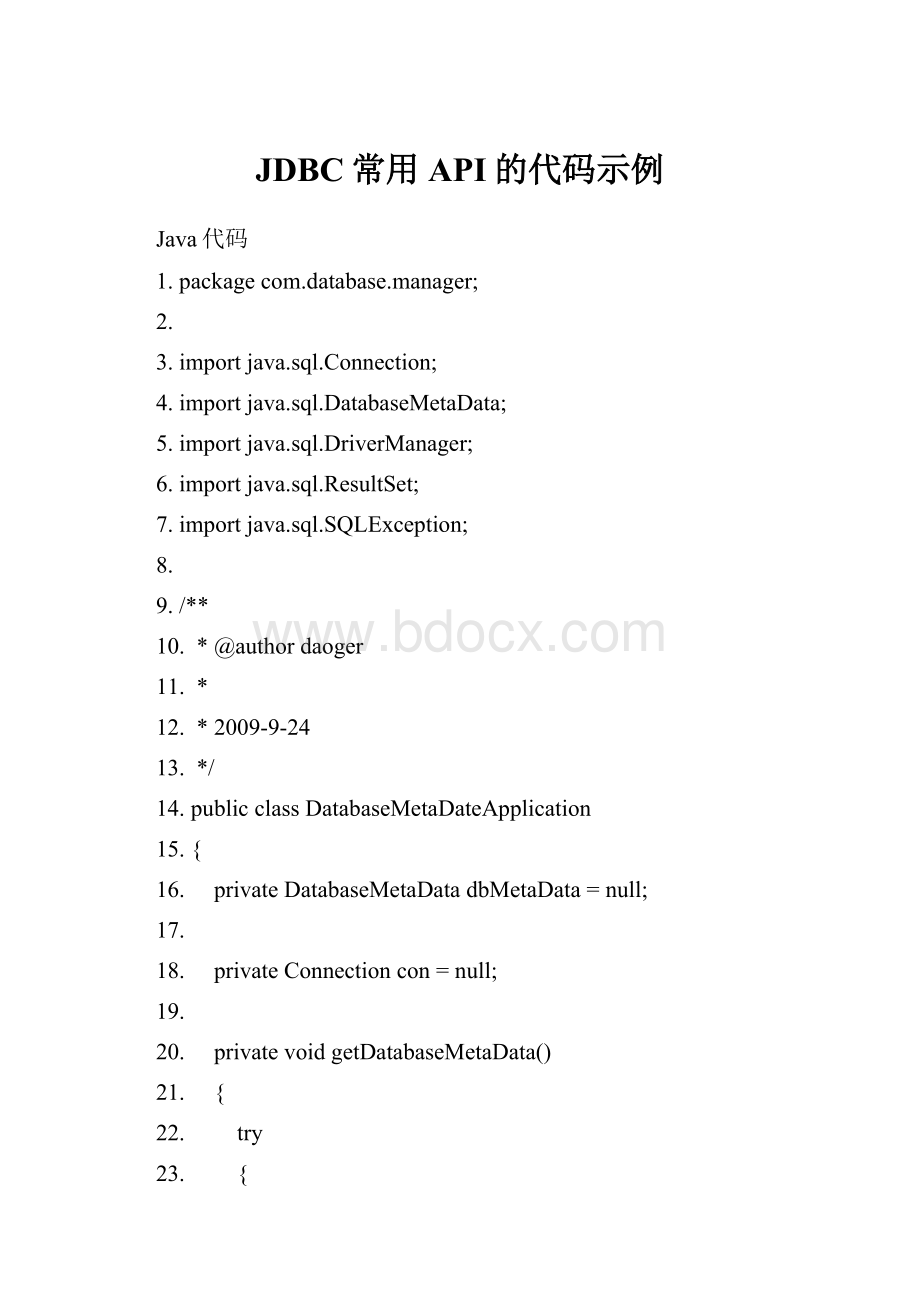JDBC常用API的代码示例.docx
《JDBC常用API的代码示例.docx》由会员分享,可在线阅读,更多相关《JDBC常用API的代码示例.docx(18页珍藏版)》请在冰豆网上搜索。

JDBC常用API的代码示例
Java代码
1.package com.database.manager;
2.
3.import java.sql.Connection;
4.import java.sql.DatabaseMetaData;
5.import java.sql.DriverManager;
6.import java.sql.ResultSet;
7.import java.sql.SQLException;
8.
9./**
10. * @author daoger
11. *
12. * 2009-9-24
13. */
14.public class DatabaseMetaDateApplication
15.{
16. private DatabaseMetaData dbMetaData = null;
17.
18. private Connection con = null;
19.
20. private void getDatabaseMetaData()
21. {
22. try
23. {
24. if (dbMetaData == null)
25. {
26. Class.forName("oracle.jdbc.driver.OracleDriver");
27. String url = "jdbc:
oracle:
thin:
@192.168.0.2:
1521:
×××";
28. String user = "×××";
29. String password = "×××";
30. con = DriverManager.getConnection(url, user, password);
31. dbMetaData = con.getMetaData();
32. }
33. } catch (ClassNotFoundException e)
34. {
35. // TODO:
handle ClassNotFoundException
36. e.printStackTrace();
37. } catch (SQLException e)
38. {
39. // TODO:
handle SQLException
40. e.printStackTrace();
41. }
42. }
43.
44. public void colseCon()
45. {
46. try
47. {
48. if (con !
= null)
49. {
50. con.close();
51. }
52. } catch (SQLException e)
53. {
54. // TODO:
handle SQLException
55. e.printStackTrace();
56. }
57. }
58.
59. /**
60. * 获得数据库的一些相关信息
61. */
62. public void getDataBaseInformations()
63. {
64. try
65. {
66. System.out.println("URL:
" + dbMetaData.getURL() + ";");
67. System.out.println("UserName:
" + dbMetaData.getUserName() + ";");
68. System.out.println("isReadOnly:
" + dbMetaData.isReadOnly() + ";");
69. System.out.println("DatabaseProductName:
" + dbMetaData.getDatabaseProductName() + ";");
70. System.out.println("DatabaseProductVersion:
" + dbMetaData.getDatabaseProductVersion() + ";");
71. System.out.println("DriverName:
" + dbMetaData.getDriverName() + ";");
72. System.out.println("DriverVersion:
" + dbMetaData.getDriverVersion());
73. } catch (SQLException e)
74. {
75. // TODO:
handle SQLException
76. e.printStackTrace();
77. }
78. }
79.
80. /**
81. * 获得该用户下面的所有表
82. */
83. public void getAllTableList(String schemaName)
84. {
85. try
86. {
87. // table type. Typical types are "TABLE", "VIEW", "SYSTEM
88. // TABLE", "GLOBAL TEMPORARY", "LOCAL TEMPORARY", "ALIAS",
89. // "SYNONYM".
90. String[] types =
91. { "TABLE" };
92. ResultSet rs = dbMetaData.getTables(null, schemaName, "%", types);
93. while (rs.next())
94. {
95. String tableName = rs.getString("TABLE_NAME");
96. // table type. Typical types are "TABLE", "VIEW", "SYSTEM
97. // TABLE", "GLOBAL TEMPORARY", "LOCAL TEMPORARY", "ALIAS",
98. // "SYNONYM".
99. String tableType = rs.getString("TABLE_TYPE");
100. // explanatory comment on the table
101. String remarks = rs.getString("REMARKS");
102. System.out.println(tableName + "-" + tableType + "-" + remarks);
103. }
104. } catch (SQLException e)
105. {
106. // TODO:
handle SQLException
107. e.printStackTrace();
108. }
109. }
110.
111. /**
112. * 获得该用户下面的所有视图
113. */
114. public void getAllViewList(String schemaName)
115. {
116. try
117. {
118. String[] types =
119. { "VIEW" };
120. ResultSet rs = dbMetaData.getTables(null, schemaName, "%", types);
121. while (rs.next())
122. {
123. String viewName = rs.getString("TABLE_NAME");
124. // table type. Typical types are "TABLE", "VIEW", "SYSTEM
125. // TABLE", "GLOBAL TEMPORARY", "LOCAL TEMPORARY", "ALIAS",
126. // "SYNONYM".
127. String viewType = rs.getString("TABLE_TYPE");
128. // explanatory comment on the table
129. String remarks = rs.getString("REMARKS");
130. System.out.println(viewName + "-" + viewType + "-" + remarks);
131. }
132. } catch (SQLException e)
133. {
134. // TODO:
handle SQLException
135. e.printStackTrace();
136. }
137. }
138.
139. /**
140. * 获得数据库中所有方案名称
141. */
142. public void getAllSchemas()
143. {
144. try
145. {
146. ResultSet rs = dbMetaData.getSchemas();
147. while (rs.next())
148. {
149. String tableSchem = rs.getString("TABLE_SCHEM");
150. System.out.println(tableSchem);
151. }
152. } catch (SQLException e)
153. {
154. // TODO:
handle SQLException
155. e.printStackTrace();
156. }
157. }
158.
159. /**
160. * 获得表或视图中的所有列信息
161. */
162. public void getTableColumns(String schemaName, String tableName)
163. {
164. try
165. {
166. ResultSet rs = dbMetaData.getColumns(null, schemaName, tableName, "%");
167. while (rs.next())
168. {
169. // table catalog (may be null)
170. String tableCat = rs.getString("TABLE_CAT");
171. // table schema (may be null)
172. String tableSchemaName = rs.getString("TABLE_SCHEM");
173. // table name
174. String tableName_ = rs.getString("TABLE_NAME");
175. // column name
176. String columnName = rs.getString("COLUMN_NAME");
177. // SQL type from java.sql.Types
178. int dataType = rs.getInt("DATA_TYPE");
179. // Data source dependent type name, for a UDT the type name is
180. // fully qualified
181. String dataTypeName = rs.getString("TYPE_NAME");
182. // table schema (may be null)
183. int columnSize = rs.getInt("COLUMN_SIZE");
184. // the number of fractional digits. Null is returned for data
185. // types where DECIMAL_DIGITS is not applicable.
186. int decimalDigits = rs.getInt("DECIMAL_DIGITS");
187. // Radix (typically either 10 or 2)
188. int numPrecRadix = rs.getInt("NUM_PREC_RADIX");
189. // is NULL allowed.
190. int nullAble = rs.getInt("NULLABLE");
191. // comment describing column (may be null)
192. String remarks = rs.getString("REMARKS");
193. // default value for the column, which should be interpreted as
194. // a string when the value is enclosed in single quotes (may be
195. // null)
196. String columnDef = rs.getString("COLUMN_DEF");
197. //
198. int sqlDataType = rs.getInt("SQL_DATA_TYPE");
199. //
200. int sqlDatetimeSub = rs.getInt("SQL_DATETIME_SUB");
201. // for char types the maximum number of bytes in the column
202. int charOctetLength = rs.getInt("CHAR_OCTET_LENGTH");
203. // index of column in table (starting at 1)
204. int ordinalPosition = rs.getInt("ORDINAL_POSITION");
205. // ISO rules are used to determine the nullability for a column.
206. // YES --- if the parameter can include NULLs;
207. // NO --- if the parameter cannot include NULLs
208. // empty string --- if the nullability for the parameter is
209. // unknown
210. String isNullAble = rs.getString("IS_NULLABLE");
211. // Indicates whether this column is auto incremented
212. // YES --- if the column is auto incremented
213. // NO --- if the column is not auto incremented
214. // empty string --- if it cannot be determined whether the
215. // column is auto incremented parameter is unknown
216. String isAutoincrement = rs.getString("IS_AUTOINCREMENT");
217. System.out.println(tableCat + "-" + tableSchemaName + "-" + tableName_ + "-" + columnName + "-"
218. + dataType + "-" + dataTypeName + "-" + columnSize + "-" + decimalDigits + "-" + numPrecRadix
219. + "-" + nullAble + "-" + remarks + "-" + columnDef + "-" + sqlDataType + "-" + sqlDatetimeSub
220.